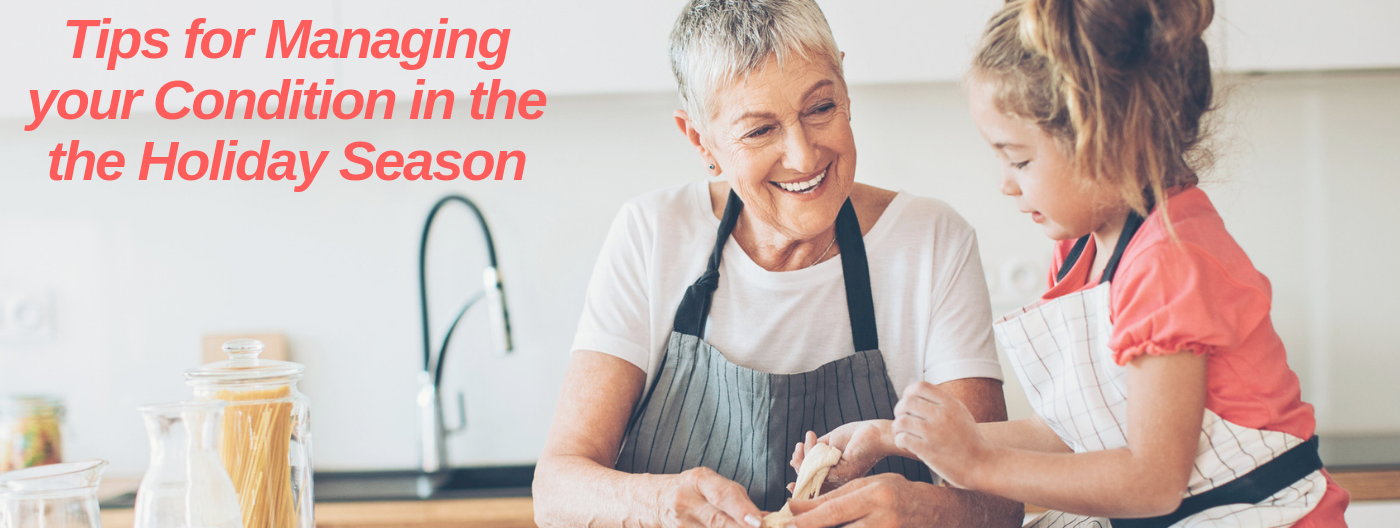The festive season can be a busy time of shopping, cooking, cleaning and gathering with family and friends. With a chronic condition, however, it can also be a difficult time managing your energy levels, eating (and drinking!), organising travel and managing stress. You may feel that you need to keep up and meet your own and your family’s expectations. Here are some tips that can help you manage this festive season while looking after yourself.
Maintaining your Energy Levels
Maintaining and managing your energy levels can help assist you to avoid fatigue, exhaustion, or a complete ‘wipe-out’ – when you need to sit or lie down to recover. This isn’t ideal during the holiday period as we all love to get involved with the festivities, so here are some tips to assist.
Planning: plan what you need to get done, make a list and spread it over the coming weeks. Space out the most demanding tasks so that they don’t have to be completed all at once and have rest days in between.
Perhaps, you could cook ahead and freeze it, give your family members a list of food/decorations they can bring or have a working bee with your grandkids/family members – they will love spending time with you and contributing – sometimes it may be as easy as asking. Also consider handing over the reins to the next generation.
Prioritising: make a list and put them in order of importance. Does it need to be done this week, can I put it off until next week? You could also ask for help and plan to get things done when you know people are available to assist. Also know that you can say no if you need to.
Pacing: Break down chores or tasks into smaller, achievable parts. Have regular breaks and stop before you get too fatigued.
Shopping: Consider doing your shopping online, not just Christmas presents but also your groceries and have them delivered. Much easier than dealing with finding a car park, Christmas crowds and lugging parcels around.
Travel Tips
The opportunity to see your loved ones is often worth the pain of travelling there, but hopefully these tips can help assist make that trip a little bit easier and more comfortable.
- Talk to your GP to ensure that you have enough medication for the duration of the trip, plus extra in case of lost baggage or delays. Plus obtain a letter from your doctor for overseas trips stating your medications and medical history. (when we are back to O/S travel!).
- Pack your medication in your hand luggage in case your luggage is lost.
- Avoid scheduling a departure early in the morning, so you are well rested for the day ahead
- Don’t stay too still for too long, practice good posture and move your feet and stretch your arms and legs periodically.
- For flights, try and book an aisle seat so that you are free to move around as needed. Also let the staff know of your condition so they can provide assistance with putting luggage in the overhead compartment, providing extra pillows and blankets and for anything else that you may need.
- For the car, ensure you schedule includes plenty of rest stops, adjust the seat, head rest etc to comfortable positions; pack the car the night before and bring a cushion or back rest if you need it. You could also consider taking a small esky to keep cool packs in for your journey.
Managing Stress
It truly is the season to be jolly! However, we have all felt the stress of fighting crowds, trying to find parking, increased traffic on the roads, preparing meals etc. Placing extra stress on your body can flare up arthritis. So here is a quick tip you can use that may help de-stress you as you go about the holidays.
Breathing Exercises
Close your eyes and take a deep breath in for a count of four and exhale for a count of eight. As you inhale, imagine oxygen flowing through your body; as you exhale imagine the stress you’ve been holding float away. Repeat five times.
This practice helps to activate our parasympathetic nervous system. It helps to put your body in ‘rest & digest mode’ instead of the ‘fight or flight’ mode; that we experience when we are stressed or anxious.
Try it for yourself, it’s easy and could make a significant difference to how you manage stress at this busy time.
Also consider listening to your favourite music that soothes you, keeping hydrated with water and herbal tea and practice gratefulness – focus on the good things in your life.
Careful Eating
Did you know that every 1kg increase in weight = an increase of 4kg in force across the joint?
It comes as no surprise that when the holidays roll around, so too does all the festive eating. Understandably it’s hard to resist, and after a few extravagant meals, you may come to realise you have put on a little weight. We don’t say not to enjoy eating in celebration, but you could just try your best to make conscious choices as well as counter it with some movement.
Perhaps you could:
- Enjoy everything but have smaller serves
- Substitute – have fruit instead of dessert, salads instead of bread, yoghurt instead of custard or ice cream – you get the idea!
- Get a friend or loved one to become your ‘eating buddy’ to help you stay on track. Tell them your plans and maybe they can do it with you.
- Drink plenty of water, it keeps you hydrated and can keep you feeling fuller
Physical Activity
Some ways to include physical activity into your days of festivity:
- Go for a walk in between meals – walk at your level and invite your loved ones along – it could be a lovely time to share one-on-one time with family that you may not see often.
- Doing a lot of sitting? Consider sit to stands exercises. Instead of just getting up out of the chair, do a few repetitions of it each time.
- Enjoy the summer heat, and get into a pool – gentle movement or walking through the pool may be a good option.
- Having a hard time coming up with a Christmas present from the family? Why not get something to help you stay active. It could range from something like a bike, a fitness tracking watch or payment for exercise classes.
- As the New Year approaches, you may wish to use the down time to formulate a plan of attack on making next year a more active year than the last. This may involve thinking about your current exercise levels, your goals for the year and how to go about achieving them (central to which may be getting a referral to an exercise physiologist or physiotherapist for an assessment and tailored exercise plan).
Please ensure that you check with you GP before doing any starting any new exercise routines.
Rest & Sleep
- Try and keep to your bedtime schedule and get enough sleep each night.
- Limit eating/drinking and physical activity late at night and sleep in a quiet, dark room. You could also consider a weighted blanket if you are feeling anxious and having trouble falling or staying asleep.
- Consider afternoon naps if you feel yourself starting to become fatigued.
- Write down a list before bedtime, so you don’t have a millions thoughts whirling around in your mind!
Overall be good to yourself, feel comfortable saying no if you need to and try to avoid past triggers that may cause a flare -up or cause extra pain or fatigue.
We hope that you find these holiday tips helpful and we wish you and your loved ones a
happy and healthy festive season!
Kar Keane, Health Educator
December, 2020
Arthritis NSW – we’re here to help
We’re here to help whenever you need us. We have a variety of options available for support and information.
- Register for our free webinars here
- For more BLOG articles about managing your arthritis, please visit our News page here.
- Sign up to eNews to get information and advice on managing your condition
- Call our free helpline on 1800 011 041 (Monday to Friday, 9am to 5pm)
- We are a health charity, help us to deliver our services – donate here
- Join our online community: Follow us on Facebook or Instagram
- Subscribe to our magazine, more info here
- Become a member, more info here

